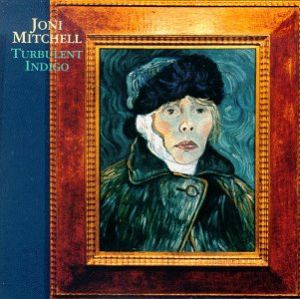
- Format: MP3

Joni Mitchell returned to the relatively spare style of albums like Hejira and her early folk collections on Turbulent Indigo, emphasizing her acoustic guitar strumming and singing on a series of songs that detail the political and social discontent she had previously explored on Dog Eat Dog and Chalk Mark in a Rainstorm. In the brief opener, "Sunny Sunday," a woman tries to shoot out a streetlight with a pistol and misses every night, a metaphor for the individual's futile struggle against civilization, and Mitchell repeats much the same message in songs like "Sex Kills," a generalized criticism of everything from lawyers to the hole in the ozone layer; "Turbulent Indigo," which describes the inability of people to understand artists; "Last Chance Lost," which treats romantic disappointment, and "Not to Blame," about spousal abuse. The low-key music and restrained vocals stand in contrast to the lyrics — over and over, Mitchell's imagery refers to guns and violence. Turbulent Indigo provides a disturbing view of modern life made all the more compelling by its calm presentation.